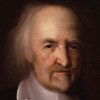“ As reason makes no demands contrary to nature, it demands, that every man should love himself, should seek that which is useful to him—I mean, that which is really useful to him, should desire everything which really brings man to greater perfection, and should, each for himself, endeavour as far as he can to preserve his own being. ”
Baruch Spinoza, Ethics (1677). copy citation
| Author | Baruch Spinoza |
|---|---|
| Source | Ethics |
| Topic | perfection love |
| Date | 1677 |
| Language | English |
| Reference | |
| Note | Translated by R. H. M. Elwes |
| Weblink | http://www.gutenberg.org/files/3800/3800-h/3800-h.htm |
Context
“It now remains for me to show what course is marked out for us by reason, which of the emotions are in harmony with the rules of human reason, and which of them are contrary thereto. But, before I begin to prove my Propositions in detailed geometrical fashion, it is advisable to sketch them briefly in advance, so that everyone may more readily grasp my meaning.
As reason makes no demands contrary to nature, it demands, that every man should love himself, should seek that which is useful to him—I mean, that which is really useful to him, should desire everything which really brings man to greater perfection, and should, each for himself, endeavour as far as he can to preserve his own being. This is as necessarily true, as that a whole is greater than its part. (Cf. III. iv.)
Again, as virtue is nothing else but action in accordance with the laws of one's own nature (IV. Def. viii.) , and as no one endeavours to preserve his own being, except in accordance with the laws of his own nature, it follows, first, that the foundation of virtue is the endeavour to preserve one's own being, and that happiness consists in man's power of preserving his own being;”
source



